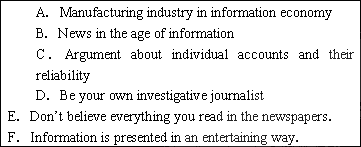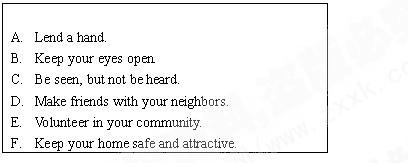题目内容
下面文章中有5处需要添加小标题。请从以下选项(A、B、C、D、E和F)中选出符合各段意思的小标题。选项中有一项是多余选项。
Directions:Read the following text and choose the most suitable heading from A-F for each paragraph.There is one extra heading which you do not need.

1._________
With the arrival of the age of “information economy”, intellectual work is becoming a more important source of wealth than manufacturing.Organizations in all walks of life are doing more to spread their information.So people of the Public Relations are hired to speak for them.A lot of our news is actually collected from press releases and reports of events intentionally staged for journalists.In the information age, journalists spend their time, not investigating, but passing on the words of a spokesperson.
2._________
There is a joke in the novel Scoop about the newspaper’s owner, Lord Copper.The editors can never disagree with him.When he’s right about something they answer “definitely”, and when he’s wrong they say “to some extent, Lord Copper.” It seems reasonable to suppose that, in the real world, the opinions of such powerful people still influence the journalists and editors who work for them.
3._________
In countries where the news is not officially controlled, it may be provided by commercial organizations who depend on advertising.The news has to attract viewers and maintain its audience ratings.I suspect that some stories get air-time just because there happen to be exciting pictures to show.In Britain, we have the tabloid newspapers which millions of people read simply for entertainment.There is progressively less room for historical background, or statistics, which are harder to present as a sensational story.
4._________
There is an argument that with spreading access to the internet and cheap technology for recording sound and images we will all be able to find exactly the information we want.People around the world will be able to publish their own eye-witness accounts and compete with the widely-accepted news-gatherers on equal terms.But what it will mean also is that we’ll be subjected to a still greater amount of nonsense and lies.Any web log may contain the latest information of the year, or equally, a made-up story that you will never be able to check.
5._________
Maybe the time has come to do something about it, and I don’t just mean changing your choice of TV channel or newspaper.In a world where everyone wants you to listen to their version, you only have two choices:switch off altogether or start looking for sources you can trust.The investigative journalist of the future is everyone who wants to know the truth.
解析:
|
B E F C D |

下面文章中有5处需要添加小标题。请从以下选项( A、B、 C、D、E和F)中选出符合各段意思的小标题,并在答题纸上将相应选项的标号涂黑。选项中有一项是多余选项。
| A. Find a fiction book. B. Learn how to read your card. C. Find your non-fiction book. D. Decide if you want to search by author, title or subject. E. Learn to find the card you need. F. Understand the Dewey Decimal System. |
The card catalog was once found in every library. Most libraries have now replaced the card catalog with a computerized cataloging system. However, some libraries still have the set of drawers with thousands of cards inside, and some library patrons still prefer the hands-on approach to researching the information they need. Cards are set up alphabetically in long drawers. Different types of cards are kept separate from each other so you may search by author, title or subject. Learning to use the card catalog can help you find the book you want without waiting for a computer terminal.
Instructions:
1______
Once you have found the card for the book you want, write down the numbers and letters at the top of the card and the title and author of the book. The numbers at the top are how the book is cataloged using the Dewey Decimal System, and the letters are the first three letters of the author's last name. Your library will have the numbers at the end of the stacks (the shelves of books), so find the stack your book is located in, then scan the shelves of that stack until you locate the number on the card. More than one book can have the same number, so you will narrow down your search if you have the first three letters of the author's name.
2______
The cards in a card catalog reference other cards. An author card will also have a book title and subject, a title card will have the author and subject, and a subject card will have author and title. This is handy for cross-referencing, so if you want to read a book on beekeeping, you can look that up in the subject cards and find an individual card on each book the library carries on beekeeping.
3______
If you want to look up a book by Stephen King, find the author cards in your library's card catalog, and look under "K". The cards are organized by last name and are broken down into the individual drawers. Sometimes a letter will take up more than one drawer, so you may find drawers that have "Ka-Ke" and then "Ki-Kr." Stephen King will be in the drawer with "Ki-Kr." You would find a card in a similar manner by title or by subject by finding the drawer with the corresponding letters such as "Be" for beekeeping in the subject cards or "Wr" for "The Writer's Market" ("The" is not considered part of titles).
4______
This isn't required to use the card catalog, but it can make searching for your book a little easier. The numbers range from 000 to 999; 000-099 are general subjects, 100-199 are psychology and philosophy, 200-299 is religion, 300-399 is social science, 400-499 is language, 500-599 are natural science and math, 600-699 is applied sciences, 700-799 is art, 800-899 are literature and plays, and 900-999 are geography and history.
5______
The author card will have a call number at the top, a line with the author's name with last name first, then lines for the title of the book, its publisher, a brief summary and subject listings. For an author with many books like Stephen King, there will be a card for each of his books in alphabetical order. Title cards are similar but have the title first, then the author in the following line. Subject cards have the subject in all capital letters at the very top of the card and the same information as on an author's card. Many cards on the same subject will be organized by the authors' last names.

 and make a lifelong friend.
and make a lifelong friend. the neighborhood. Are strange people carrying expensive things out of one neighbor’s house? Have several days passed since your elderly neighbor last collected his newspaper? The benefit of keeping an eye out for unusual behavior in the neighborhood is that others will do the same for you.
the neighborhood. Are strange people carrying expensive things out of one neighbor’s house? Have several days passed since your elderly neighbor last collected his newspaper? The benefit of keeping an eye out for unusual behavior in the neighborhood is that others will do the same for you.